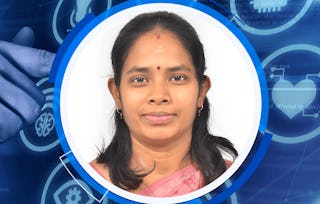This course is designed for business professionals that wish to identify basic concepts that make up machine learning, test model hypothesis using a design of experiments and train, tune and evaluate models using algorithms that solve classification, regression and forecasting, and clustering problems.

Train Machine Learning Models

Train Machine Learning Models
This course is part of CertNexus Certified Data Science Practitioner Professional Certificate


Instructors: Stacey McBrine
1,879 already enrolled
Included with
Recommended experience
Skills you'll gain
Details to know

Add to your LinkedIn profile
See how employees at top companies are mastering in-demand skills

Build your Machine Learning expertise
- Learn new concepts from industry experts
- Gain a foundational understanding of a subject or tool
- Develop job-relevant skills with hands-on projects
- Earn a shareable career certificate from CertNexus

There are 5 modules in this course
In the previous courses in the CDSP specialization, your data underwent a great deal of preparation. It's time to start looking at developing machine learning models. These models will be instrumental in achieving your business objectives because they can intelligently estimate much about the world. But before you start building these models, you need to have a firm grasp on what goes into machine learning and what it means to use machine learning to test a hypothesis.
What's included
15 videos6 readings1 assignment2 peer reviews1 discussion prompt
The first type of machine learning task you'll build models for is classification. Classification has many applications across many different fields, so it's a good starting point. In this module, you'll train classification models, tune those models, and then evaluate them as part of a process of iterative improvement.
What's included
18 videos9 readings1 assignment1 discussion prompt7 ungraded labs
The next major machine learning task you'll undertake is regression. Whereas classification is about placing things in categories, regression is about estimating numbers. As with the previous module, in this module you'll train, tune, and then evaluate models that perform regression.
What's included
13 videos7 readings1 assignment1 discussion prompt4 ungraded labs
You've built supervised learning models using both classification and regression. But now it's time to work with unsupervised learning, where labeled data is not readily available. In this module, you'll implement unsupervised learning in the form of clustering models, which can group observations that share common traits. Just like before, you'll develop these models as a process of training, tuning, and evaluation.
What's included
9 videos5 readings1 assignment1 discussion prompt4 ungraded labs
You have developed models for classification, regression and clustering, in this module you will apply what you have learned working within a practical scenario. Using a Jupyter notebook you will perform machine learning tasks. You are given the choice of three notebooks, each of which leverages a different type of algorithm.
What's included
1 peer review1 ungraded lab
Earn a career certificate
Add this credential to your LinkedIn profile, resume, or CV. Share it on social media and in your performance review.
Offered by
Explore more from Machine Learning
 Status: Free
Status: FreeAmazon Web Services
 Status: Free Trial
Status: Free Trial Status: Preview
Status: PreviewThe University of Chicago
 Status: Preview
Status: PreviewO.P. Jindal Global University
Why people choose Coursera for their career

Felipe M.

Jennifer J.

Larry W.

Chaitanya A.

Open new doors with Coursera Plus
Unlimited access to 10,000+ world-class courses, hands-on projects, and job-ready certificate programs - all included in your subscription
Advance your career with an online degree
Earn a degree from world-class universities - 100% online
Join over 3,400 global companies that choose Coursera for Business
Upskill your employees to excel in the digital economy
Frequently asked questions
To access the course materials, assignments and to earn a Certificate, you will need to purchase the Certificate experience when you enroll in a course. You can try a Free Trial instead, or apply for Financial Aid. The course may offer 'Full Course, No Certificate' instead. This option lets you see all course materials, submit required assessments, and get a final grade. This also means that you will not be able to purchase a Certificate experience.
When you enroll in the course, you get access to all of the courses in the Certificate, and you earn a certificate when you complete the work. Your electronic Certificate will be added to your Accomplishments page - from there, you can print your Certificate or add it to your LinkedIn profile.
More questions
Financial aid available,
¹ Some assignments in this course are AI-graded. For these assignments, your data will be used in accordance with Coursera's Privacy Notice.

